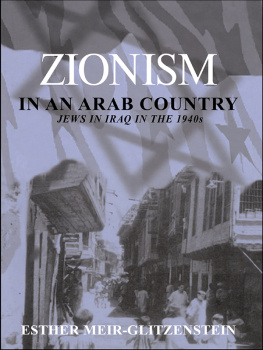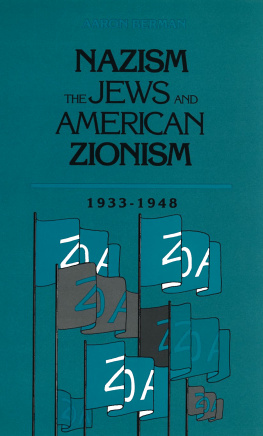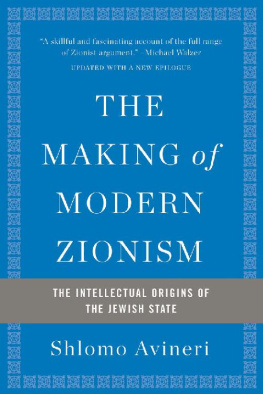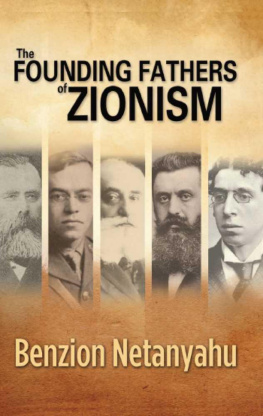Thank you for buying this ebook, published by NYU Press.
Sign up for our e-newsletters to receive information about forthcoming books, special discounts, and more!
Sign Up!
About NYU Press
A publisher of original scholarship since its founding in 1916, New York University Press Produces more than 100 new books each year, with a backlist of 3,000 titles in print. Working across the humanities and social sciences, NYU Press has award-winning lists in sociology, law, cultural and American studies, religion, American history, anthropology, politics, criminology, media and communication, literary studies, and psychology.
The Emergence of American Zionism
Preface
The image of Zionist pioneers in the late nineteenth and early twentieth centurieshardworking, brawny, and living off the landsprang from Labor Zionism, the ascendant socialist Zionist movement in Palestine. The building of the Yishuv, the new Jewish society in Palestine, was accompanied by the rapid growth of Zionism worldwide.
How did Zionism take shape in the United States? How did Labor Zionism and the Yishuv influence American Jews? This book argues that Zionism and Labor Zionism had a much greater impact on the American Jewish scene than has been recognized. It traces Labor Zionisms dramatic transformation in the United States from a marginal immigrant party into a significant political force. It shows how and why Labor Zionism in the United Statesthe voice of Labor Palestine on American soilplayed a role disproportionate to its size in formulating the program and outlook of American Zionism. It also examines more generally the impact of Zionism on American Jews, making the case that Zionisms cultural vitality, intellectual diversity, and unparalleled ability to rally public opinion in times of crisis were central to the American Jewish experience.
This book, which originally was my doctoral dissertation at Brandeis University, would not have been possible without the steadfast support of my mentors: Jehuda Reinharz, Jonathan D. Sarna, and Stephen J. Whitfield. Since I began my graduate studies, they have persistently challenged and inspired me, leaving an indelible impression on my work as a modern Jewish historian. It is my hope that this book justifies their extraordinary investment in time and energy on my behalf.
In the course of my research, I also benefited from the reservoir of human talent associated with the Brandeis community. A special word of thanks must go to Sylvia Fuks Fried, who labored through multiple drafts of the manuscript and made numerous valuable suggestions for its revision and improvement. For their scholarly expertise, I am grateful to Joyce Antler, Sylvia Barack Fishman, Michael Brenner, Marc Brettler, the late Marvin Fox, Antony Polonsky, Benjamin C. I. Ravid, Shulamit Reinharz, Bernard Reisman, the late Marshall Sklare, Daniel J. Tichenor, and Bernard Wasserstein. Lawrence H. Fuchs and Leon A. Jick were particularly gracious, generous, and inspiring tutors. Joanna Gould went out of her way to offer much needed computer assistance. Janet Webber of the Tauber Institute for the Study of European Jewry was exceptionally helpful. In the Judaica Division of the University Libraries, Jim Rosenbloom, Charles Cutter, and Nancy Zibman were an unflagging source of research support. Julian Brown provided expert photographic assistance.
Over the years, several other people have guided and encouraged my research efforts. I am deeply grateful to Aharon Appelfeld, Murray Baumgarten, Michael Brown, Mitchell Cohen, the late Moshe Davis, Sidra DeKoven Ezrahi, Leonard Fein, Henry Feingold, Evyatar Friesel, Allon Gal, Lloyd P. Gartner, Aryeh Goren, Gerd Korman, Eli Lederhendler, Paul Mendes-Flohr, Derek J. Penslar, Robert M. Seltzer, Anita Shapira, Gideon Shimoni, Shelly Tenenbaum, Melvin I. Urofsky, Chaim Waxman, and Robert Wistrich. At the University at Albany, State University of New York, where I completed this book, I have enjoyed the collegiality of Judith R. Baskin, Jerome Eckstein, Daniel Grossberg, and Stanley Isser. Special thanks are also due Muki Tsur of Kibbutz Ein Gev, Israel, who nurtured my interest in the cultural history of the Yishuv. Mishael M. Caspi, currently of Bates College, is a devoted teacher and friend. He and his wife Gila have played an inestimable role in my personal and professional growth.
A remarkable group of Zionist movement veterans shared their oral histories with me. I am grateful to David Breslau, Abe Cohen, Saadia Gelb, Nahum and Miriam Guttman, Haim Gvati, Gertrude Halpern, the late Jacob Katzman, and the late Kieve Skidell. Thanks are also due Ben Barlas for alerting me to several useful historical documents.
For archival assistance, I wish to thank the staffs of the American Jewish Archives, the Central Zionist Archives, the Lavon Institute for Labor Research, the National Center for Jewish Film, the Yad TabenkinUnited Kibbutz Movement Archives (especially Roni Azati), and the YIVO Institute for Jewish Research. Furthermore, I have been privileged to enjoy the warm support of friends and colleagues at the American Jewish Historical Society. Michael Feldberg, the societys executive director, has been an unwavering source of encouragement. I owe a special debt of gratitude to Ellen Smith, the societys curator, who read and commented on the manuscript and offered expert assistance concerning the illustrations. At each of the foregoing institutions, I was extended every possible courtesy.
Generous financial support of my work was provided by the American Jewish Historical Society; the National Foundation for Jewish Culture; the Tauber Institute for the Study of European Jewry, Brandeis University; and the YIVO Institute for Jewish Research. I also thank the Lucius N. Littauer Foundation for generously underwriting the publication costs associated with this book.
Portions of previously appeared in, respectively, From Immigrant Party to American Movement: American Labor Zionism in the Pre-State Period, American Jewish History 82 (1994): 159194; and in Pioneers and Pacesetters: Boston Jews and American Zionism, The Jews of Boston, ed. Jonathan D. Sarna and Ellen Smith (Boston: Combined Jewish Philanthropies of Boston and Northeastern University Press, 1995): 241275.
It has been a pleasure working with New York University Press. I am particularly thankful to my editors Jennifer Hammer and Despina Papazoglou Gimbel for seeing this project through to publication.
I conclude with heartfelt gratitude to my family. My parents, David and Elizabeth Raider, my siblings, Daniel and Elana, and my grandparents, Alfred and Estelle Raider, provided crucial moral support. My in-laws, Walter and Chaya Roth, showed keen interest in every stage of writing this book. For their warm encouragement, I thank Ari Roth, Kate Schecter, Judy Roth, and Stephen P. Zeldes as well as Isabel, Sophie, and Miko.







